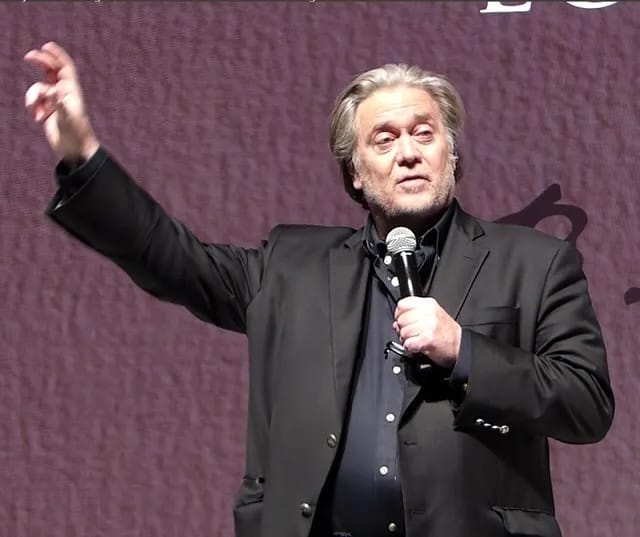When I think of religious figures shaping America today, names like Pope Leo XIV, Bishop T.D. Jakes, Pastor Rick Warren, Reverend William Barber, Joel Osteen, and Pastor Mike Todd come to mind. Add Creflo Dollar, Rev. Al Sharpton, Rabbi Angela Buchdahl, Imam Omar Suleiman, or even Minister Louis Farrakhan to the mix. All have been criticized—some frequently—but it comes with the territory.
Steve Bannon, though, is not someone you’d expect on that list. A man who once likened himself to Satan hardly fits the mold.
“Dick Cheney. Darth Vader. Satan. That’s power,” Bannon has said.
Unlike Donald Trump — who sat in church pews as a child but is in dire need of saving — Bannon at least has some grounding in faith. Raised in an Irish Catholic household, he calls himself a “conservative Catholic” and frequently uses religious language to frame his politics. Immigration, nationalism, and cultural identity become, in his hands, not policy issues but holy wars.
He’s clashed with Pope Francis over immigration and climate change, accusing the Church of supporting undocumented immigrants for “economic self-interest.” His rhetoric has fueled an anti-Francis movement among far-right Catholics, threatening to fracture the Church itself.
So when Pope Leo XIV was elected, Bannon wasted no time calling it an “anti-Trump vote” — “the worst choice for MAGA Catholics,” as he put it.
Bannon’s brand of “radical traditionalism” — or “Rad Trads” — merges ultra-conservative Catholicism with populist nationalism. He’s tried to reshape the Church from within, partnering with figures like Milo Yiannopoulos and appearing at Church Militant events, the far-right Catholic media network. He has no formal theological training. His faith, like much of his politics, shifts with the need of the moment.
Still, Bannon has gone so far as to cast Trump as a divine instrument.
“Trump is gonna be president in ’28," said Bannon. "He’s a vehicle of divine providence.”
He made that claim in The Economist, arguing that Trump’s third term was part of God’s plan. Bannon brushed aside the 22nd Amendment and hinted at “different alternatives” to keep Trump in power. If a third term were somehow allowed, what would stop a fourth—or a fifth—beyond Trump’s cholesterol? Perhaps Bannon envisions immortality for his chosen vessel.
Rep. Andy Ogles (R–Tenn.) recently introduced a constitutional amendment to allow Trump a third term, carefully worded to exclude Barack Obama. Ogles said America needed “bold leadership,” but even he didn’t claim divine inspiration.
My limited theological education tells me God can use anyone, but Steve Bannon seems an unlikely messenger. There’s been no Road to Damascus moment — just the same political chameleon wearing a rosary this time.
Bannon’s invocation of Satan is metaphorical, but no less telling. To him, the devil represents rebellion, domination, power — virtues in his worldview. No one asking, “What would Jesus do?” could land on Steve Bannon’s playbook.
He’s accused Pope Francis and the Vatican of being “globalist,” “woke,” even “Marxist.” He’s charged that Church leaders have betrayed Western civilization by supporting refugees — “a surrender to Islam,” in his words. His version of Christianity pits traditionalists against the institutional Church, casting the latter as corrupt and compromised.
At a 2014 Vatican conference, Bannon warned of a “crisis of Judeo-Christian values” and an existential war against secularism, Islam, and global capitalism. He invoked militant imagery, calling for a “spiritual war” that theologians across denominations say distorts the Gospel’s message of peace and justice.
Bannon’s worldview fuses Christian identity with nationalism, reducing faith to a political rallying cry. He’s aligned with far-right Catholic groups in the U.S. and Europe that promote anti-immigrant, anti-Muslim, and anti-LGBTQ+ agendas — all in direct contradiction to mainstream Christian ethics.
Now Bannon claims God wants Trump back in the White House and has provided him with a secret plan to make it happen. Yet his brand of spirituality is less about divine guidance than manipulation. His use of Satanic metaphors, his war with Church leadership, and his apocalyptic nationalism all reveal a faith hollowed out and repurposed for politics.
There may indeed be “signs and wonders” of Trump trying to cling to power — not rainbows or burning bushes, but troops in city streets and manipulated elections. Steve Bannon is no prophet. A third Trump term wouldn’t be God’s will — it would be man’s weakness.
When power dresses up as prophecy, it isn’t faith. It’s theater.
This post originally appeared on Medium and is edited and republished with author's permission. Read more of William Spivey's work on Medium. And if you dig his words, buy the man a coffee.
